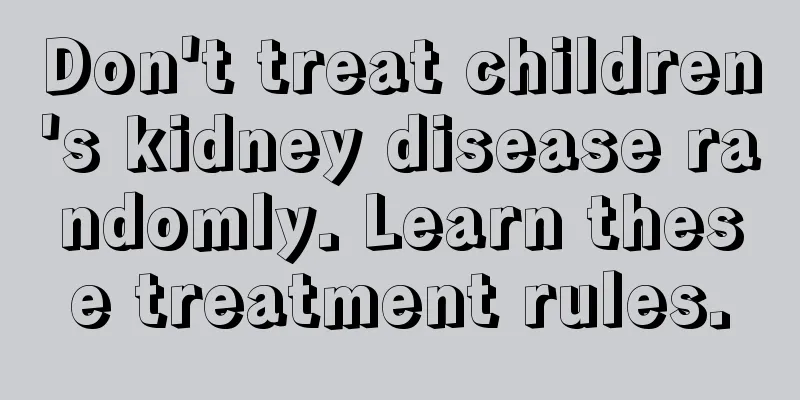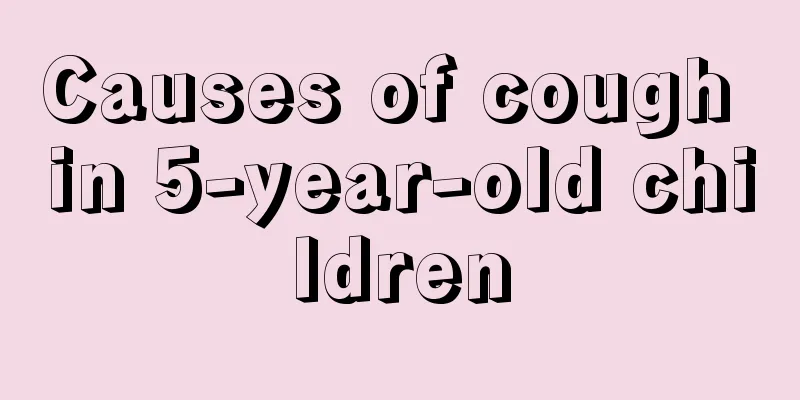Don't treat children's kidney disease randomly. Learn these treatment rules.

|
In the treatment of pediatric kidney disease, in order to achieve the best results, we must first pay attention to several principles. Medical research has found that most children's kidney diseases are related to infection, so preventing colds is the first step. You can accompany your children to play quiet games, avoid excessive fatigue and intense exercise, pay attention to physical examinations, and prevent the disease from worsening. Guidelines for the diagnosis and treatment of pediatric kidney disease Medical research has confirmed that the causes of nephrotic syndrome in children are mostly related to respiratory tract infections. If colds and tonsillitis are not controlled in time, they may cause kidney disease after a few weeks. The focus of care after illness is to prevent colds, and children should not eat high-salt and high-protein foods. Because children take hormones for a long time, their immunity is reduced and they are prone to respiratory infections. Therefore, the amount of activity of children should be strictly limited. They should play quiet games and avoid strenuous exercise that will make them tired and aggravate their condition. In addition, add or remove clothes for your child in time and keep him/her warm. Parents need to pay attention; Children with nephrotic syndrome cannot be vaccinated. They can only be vaccinated after the kidney disease is completely relieved and medication has been stopped for more than one year. Nephrotic syndrome in children has a long course, is prone to recurrence, and is difficult to treat clinically. At present, hormones, which have been used for decades, are still the first choice for the treatment of nephrotic syndrome. For patients with hormone-resistant, frequently relapsing, and hormone-dependent kidney disease, cytotoxic drugs can be used. In addition, in recent years, some scholars at home and abroad have adopted new immunosuppressive agents for treatment and achieved good results. The treatment period for nephrotic syndrome in children is long, and the disease is likely to recur. This requires parents to pay special attention to the care of their children. The best effect will be achieved by combining treatment and care. |
<<: Children often have toothaches, which can be relieved by doing this
>>: Children with poor resistance should supplement these
Recommend
What should I do if my baby can't crawl for more than 7 months?
Parents value and pay attention to each growth st...
Gray eyes in newborn
The body of a newborn is very soft, and because i...
Will stitches on a child's forehead leave scars?
When a child's forehead is hit by a sharp obj...
Clinical manifestations of sepsis in children, high fever needs to be vigilant
Pediatric sepsis is an inflammatory response caus...
Why does my baby have phlegm in his throat when feeding?
The baby's physical health is a very importan...
What to do if your baby poops many times a day
Many babies have the problem of defecating many t...
How to treat children's eczema
Eczema is a common childhood disease. Since child...
What knowledge do you have about artificial feeding of infants?
Artificial feeding is a way of feeding babies whe...
How to prevent complications of colds in children
In daily life, children's colds are often ign...
5 month old baby sweats when sleeping
Every child is the center of the family, so paren...
What are the characteristics of children in kindergarten?
Generally speaking, children will go to kindergar...
How to treat asthma in children and what should you pay attention to?
Asthma is related to polygenic inheritance. The p...
Are there any side effects of fluoride application to prevent dental caries in children?
Fluoride-containing substances are very effective...
Orthodontics for 7-year-olds
It is best to do orthodontic treatment as early a...
Why are the baby’s left and right arms different in thickness?
For parents, they definitely need to observe thei...









